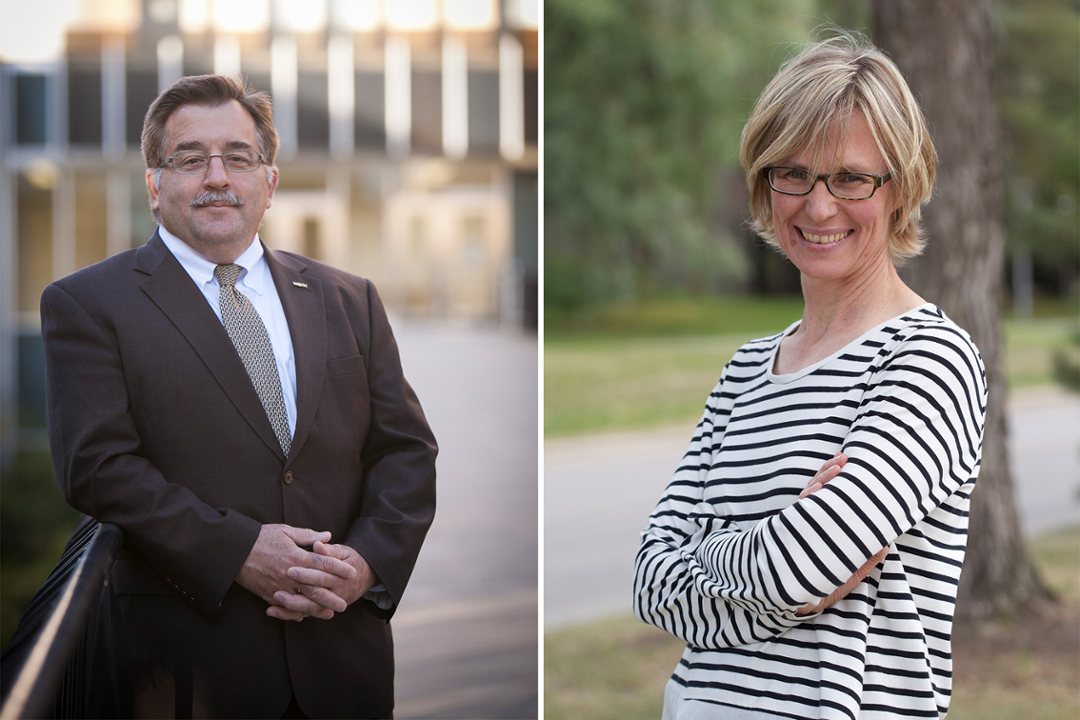
Dean steps down from USask veterinary college
Dr. Douglas Freeman, dean of the Western College of Veterinary Medicine (WCVM), will step down on June 30 and go on administrative leave from the University of Saskatchewan (USask).
By WCVM CommunicationsFreeman has served as the regional veterinary college’s leader for two five-year terms from 2010 to 2020. He decided not to pursue a third term due to personal reasons.
WCVM faculty member Dr. Gillian Muir will become the college’s acting dean for one year beginning on July 1. Muir is a professor and head of the WCVM’s Department of Veterinary Biomedical Sciences. She received her Doctor of Veterinary Medicine (DVM) degree at the WCVM in 1988 and completed a PhD degree in neuroscience at the University of British Columbia.
Since joining the WCVM faculty in 1996, Muir has become a gifted instructor and neuroscientist whose translational research work focuses on recovery after spinal cord injury. She has been recently involved in renewing the WCVM’s curriculum for its DVM program and in developing the college’s strategic plan as part of the University Plan 2025.
Freeman became the WCVM’s sixth dean in March 2010. Before moving to Saskatchewan, he gained 26 years of experience as a veterinary practitioner, administrator and researcher. Freeman completed a DVM degree, a clinical residency and a Master of Science degree in theriogenology at the University of Minnesota. He received a PhD degree in reproductive physiology from the University of Idaho and is a diplomate in the American College of Theriogenologists.
Widely recognized as an innovative leader who excels at partnership building, Freeman worked tirelessly to expand the WCVM’s international reputation for high-quality veterinary education, clinical services and research. Under his leadership, the college completed two successful accreditation visits with the American Veterinary Medical Association’s Council on Education in 2010 and 2017.
In the past few years, Freeman has played an instrumental role in developing a new, five-year Interprovincial Agreement (IPA) in collaboration with USask and the WCVM’s provincial partners — Saskatchewan, British Columbia and Manitoba. Now in the final stages of approval with the three western provinces, this longstanding agreement officially recognizes the college’s responsibilities for providing veterinary education, expertise and research in Western Canada.
Early on in Freeman’s tenure, the college completed the final stages of an eight-year, $80-million infrastructure project. That project led to nine years of additional upgrades to the college’s building and technologies, including several named facilities in a range of areas — equine and large animal health, small animal clinical services, translational research and education.
One example is the BJ Hughes Centre for Clinical Learning that supports the growing use of simulation in the college’s new, competency-based curriculum, faculty recruitment and further investments in teaching technologies. The WCVM’s most recent addition was the Allard-Roozen Imaging Suite that houses Canada’s first PET-CT unit dedicated to animal health care.
Another major building initiative in which Freeman played a key role was the USask Livestock and Forage Centre of Excellence (LFCE), a unique partnership between the university, livestock and forage industries, and the Governments of Canada and Saskatchewan.
With the dean's support, the college’s research program grew significantly in areas such as animal health and welfare, food supply and sustainability, One Health and ecosystem health, comparative medicine and translational health, and scholarship of education. The WCVM is now home to five research chairs including two research positions that are supported by Canada’s beef cattle and swine sectors.
A seasoned leader in One Health, Freeman has endeavoured to build connections between animal, human and environmental health. During his time at USask, he initiated the annual One Health Leadership Experience, a student-focused conference that encouraged interprofessional collaboration. Freeman was integral in developing the university’s Certificate in One Health for undergraduate students, and he established Canada’s first veterinary social work program in collaboration with the University of Regina’s Faculty of Social Work.
The university will begin an international search for the next dean of the WCVM in the fall of 2020.
